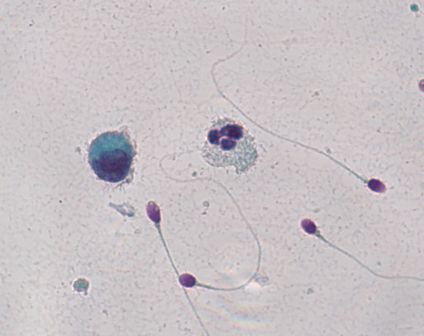Your semen analysis results came back, and it says that you have a lot of white blood cells. What does it mean?

White blood cells are the body’s soldiers to fight invaders like bacteria and viruses, and their presence in semen might signal an infection. White cells also produce superoxide radicals, bullets that riddle sperm and its precious DNA cargo.
Here’s the problem: you might not have white blood cells at all. If you put semen under the microscope, white blood cells look exactly like immature sperm cells that aren’t a problem at all. A technician needs to stain the cells to see which cells are the bad actors. In the picture, an innocuous cell is on the left, and to its right lies an angry white blood cell. It’s easy to tell the difference because they’ve been stained. But without the coloration from staining, it would be impossible to say which was which.
Unfortunately, not all labs routinely stain semen if large round cells cells are present in high amounts. Specialized semen analysis labs typically will, but general laboratories performing many different kinds of tests may not.
If your test, with staining, confirms that you do have an unhealthy amount of white blood cells in the semen, what can you do? Culturing semen in the lab doesn’t usually reveal the bacterial invaders. The prostate turns out to be remarkably good at hiding infection, making it a difficult job to find the bug causing the problem. Doctors often try a course of broad spectrum antibiotics to attack anything that may be lurking. Another strategy is to use an antioxidant like coenzyme Q10 to protect the sperm from the white blood cell’s superoxide radicals.
But first you have to know if you’re dealing with white blood cells.
